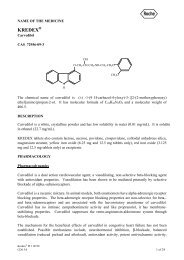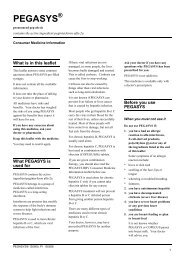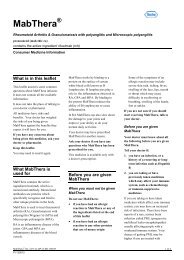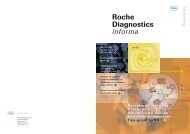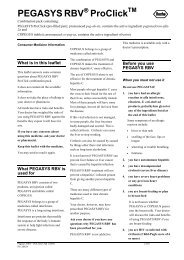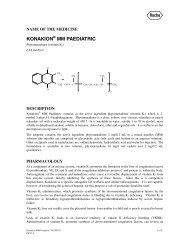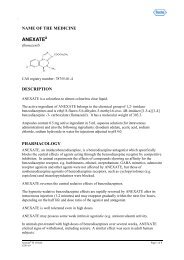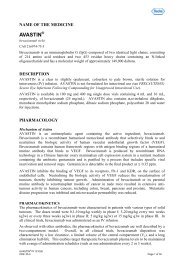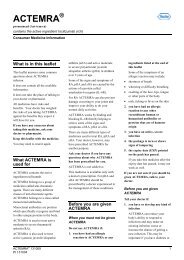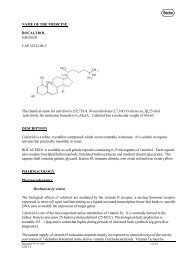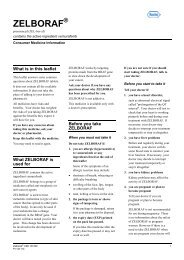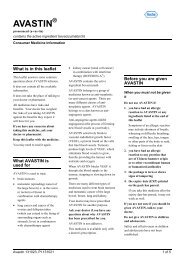Actemra (tocilizumab) Product Information (PI) - Roche Australia
Actemra (tocilizumab) Product Information (PI) - Roche Australia
Actemra (tocilizumab) Product Information (PI) - Roche Australia
Create successful ePaper yourself
Turn your PDF publications into a flip-book with our unique Google optimized e-Paper software.
CLINICAL TRIALS<br />
Rheumatoid Arthritis<br />
The efficacy of ACTEMRA in alleviating the signs and symptoms of rheumatoid arthritis<br />
was assessed in five randomised, double-blind, multicentre studies. Studies I-V required<br />
patients > age 18 with active rheumatoid arthritis diagnosed according to American<br />
College of Rheumatology (ACR) criteria who had at least 8 tender and 6 swollen joints at<br />
baseline.<br />
ACTEMRA was administered intravenously every 4 weeks as monotherapy (Study I), in<br />
combination with methotrexate (MTX) (Studies II, III, V) or with other diseasemodifying<br />
anti-rheumatic drugs (DMARDs) (Study IV).<br />
Study I (AMBITION) evaluated 673 patients who had not been treated with MTX within<br />
6 months prior to randomisation, and who had not discontinued previous MTX treatment<br />
as a result of clinically important toxic effects or lack of response. The majority (67%) of<br />
patients were MTX naïve. Doses of 8 mg/kg of ACTEMRA were given every 4 weeks as<br />
monotherapy. The comparator group was weekly MTX (dose titrated from 7.5 to a<br />
maximum of 20 mg weekly over an 8 week period). The primary endpoint was the<br />
proportion of patients who achieved an ACR20 response at week 24.<br />
Study II (LITHE), a 2 year study with a planned interim analysis at week 24 and week 52,<br />
evaluated 1196 patients who had an inadequate clinical response to MTX. Doses of 4 or 8<br />
mg/kg of ACTEMRA or placebo were given every 4 weeks as blinded therapy for 52<br />
weeks, in combination with stable MTX (10–25 mg weekly). The primary endpoint at<br />
week 24 was the proportion of patients who achieved ACR20 response criteria. At week<br />
52 the co-primary endpoints were prevention of joint damage and improvement in<br />
physical function.<br />
Study III (OPTION) evaluated 623 patients who had an inadequate clinical response to<br />
MTX. Doses of 4 or 8 mg/kg of ACTEMRA or placebo were given every 4 weeks, in<br />
combination with stable MTX (10 – 25 mg weekly). The primary endpoint was the<br />
proportion of patients who achieved an ACR20 response at week 24.<br />
Study IV (TOWARD) evaluated 1220 patients who had an inadequate response to their<br />
existing rheumatologic therapy, including one or more DMARDs. Doses of 8 mg/kg<br />
ACTEMRA or placebo were given every 4 weeks, in combination with the stable<br />
DMARD. The primary endpoint was the proportion of patients who achieved an ACR20<br />
response at week 24.<br />
Study V (RADIATE) evaluated 499 patients who had an inadequate clinical response or<br />
were intolerant to one or more anti-tumour necrosis factor (TNF) therapies. The anti-TNF<br />
agent was discontinued prior to randomisation. Doses of 4 or 8 mg/kg of ACTEMRA or<br />
placebo were given every 4 weeks, in combination with stable MTX (10 – 25 mg weekly).<br />
<strong>Actemra</strong> ® <strong>PI</strong> 131004 5 of 37<br />
CDS 8.0



